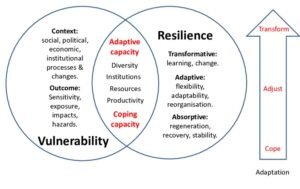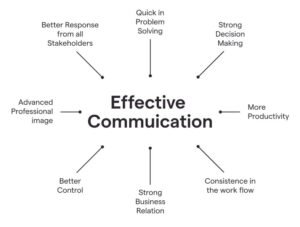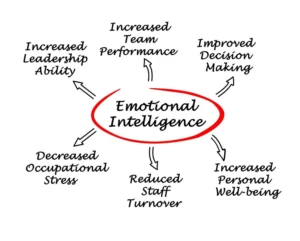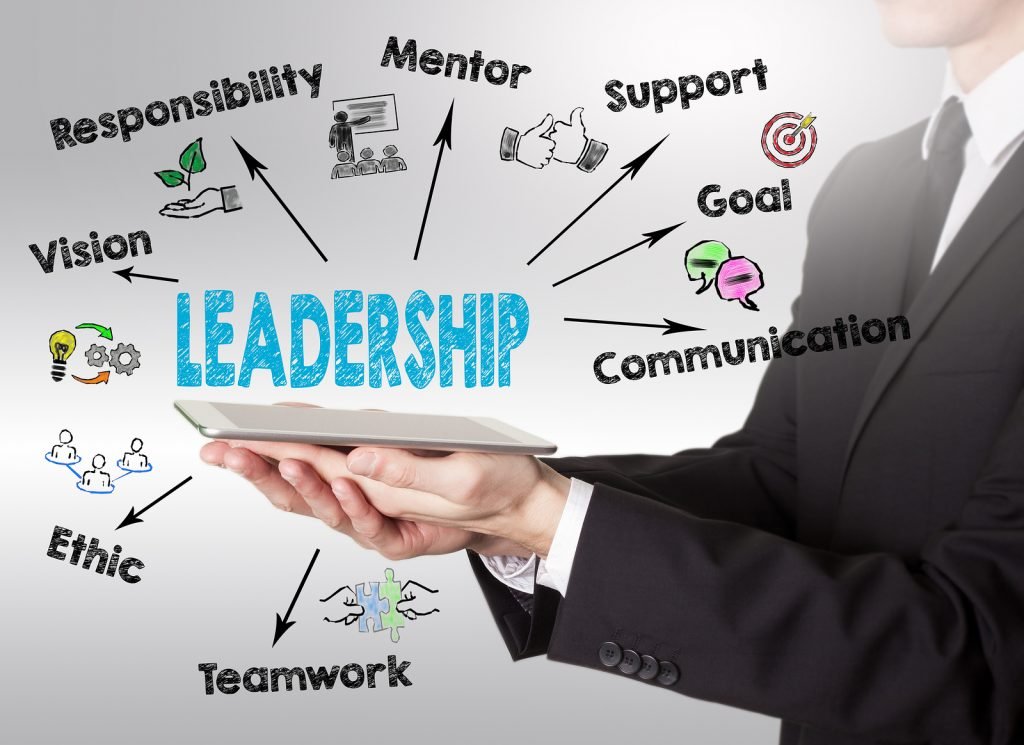Leadership Skills for Mastering the Art of Leadership : Introduction
The Significance of Acquiring Apt Leadership Skills: Effective leadership serves as an indispensable cornerstone for an organization’s triumph. It assumes a pivotal role in establishing unequivocal direction, instilling team inspiration, and realizing collective objectives. The acquisition of suitable skills stands as the crux of mastering Leadership Skill in today’s intricate corporate domain.
This comprehensive guide shall immerse you into the quintessential proficiencies every leader ought to possess, enabling them to flourish in their capacity and institute a meaningful influence.
Understanding the Core Leadership Skills & Competencies
1. Visionary Leadership Skills:

Visionary Leadership Skills are a hallmark of transformative and forward-thinking leaders. In the realm of leadership skills, possessing a visionary outlook is akin to possessing a compass that steers the organization toward an inspiring future.
Visionary leaders exhibit the ability to anticipate emerging trends, identify potential opportunities, and craft a compelling narrative that rallies their teams around a shared purpose. This skill goes beyond day-to-day operations; it encapsulates the art of painting a vivid picture of what lies ahead and inspiring others to actively contribute to that vision.
At the core of Visionary Leadership Skills is the capacity to articulate and communicate a clear, aspirational vision. These leaders possess the artistry to convey complex ideas in a simple, compelling manner that resonates with diverse stakeholders. Their skill lies not only in setting the course but also in cultivating an environment where team members are empowered to innovate, experiment, and contribute their unique perspectives toward achieving the envisioned future.
Visionary leaders recognize that their role extends beyond managing tasks that entails igniting a collective sense of purpose and fostering an unwavering commitment to realizing a shared dream. As organizations navigate through evolving landscapes, leaders armed with visionary skills illuminate the path forward, leading their teams toward success in uncharted territories.
Visionary Leadership Unveiled: Leadership skills encompass the ability to create and communicate an inspiring vision that resonates across the organization. This vision is grounded in understanding market dynamics, customer needs, and core values. A leader with visionary leadership skills passionately conveys this vision, fostering clarity and consistency.
Empowering Teams for Visionary Triumph: Among leadership skills, galvanizing teams is paramount. By setting high standards, providing insightful guidance, and fostering accountability, a skilled leader propels individual efforts toward a collective vision. Motivation strategies forge a united front, propelling the organization to resounding accomplishments.
Guidance Fuels Growth Within Teams: Leadership skills involve nurturing individual growth. Leaders adept in these skills identify strengths and areas for improvement in team members. Through constructive feedback and skill development opportunities, they cultivate a united, empowered team. Trust and loyalty flourish, fostering a positive and productive work atmosphere.
Leadership Skills: Empowerment, Inspiration, and Achievement: In the realm of leadership skills, it’s not just about authority, but about empowering, inspiring, and guiding others. By mastering these skills, leaders elevate their potential and enable team and organizational growth. Effective leadership fosters innovation, unity, and a culture of achievement. Whether innate or developed, embracing these skills yields remarkable outcomes.
2. Adaptability and Resilience:

Navigating the ever-changing corporate landscape demands a constant adaptation, where leadership skills that encompass the art of change and innovation become paramount. The capacity to pivot, alongside the determination to forge new pathways, marks the core of these proficiencies. In this dynamic environment, the importance of embracing evolution while pioneering innovation cannot be overstated.
Championing Change and Catalyzing Innovation: Leaders well-versed in dynamic leadership skills see change as a gateway to progress. They foster a culture that thrives on ingenuity, advocating experimentation and calculated risks. Such leaders are receptive to unconventional ideas, challenging established norms to ensure their organizations remain at the forefront of the swiftly evolving business terrain.
Resilience in Overcoming Challenges and Setbacks: Resilient leadership skills empower individuals to spring back from hurdles and adversities. Displaying an optimistic outlook, these leaders ignite a resilient spirit within their teams, motivating them to persevere during challenging times. By cultivating a culture of resilience, leaders pave the way for organizations to glean wisdom from setbacks, emerging even more robust and poised for enduring success.
3. Effective Communication:

Leadership skills encompass the mastery of clear and succinct communication. Clear and concise communication is a fundamental skill for effective leadership. Leaders who can articulate ideas, actively listen, and promote open dialogue create an environment of trust, collaboration, and productivity.
Clear and concise communication skills: Accomplished leaders ensure their messages are conveyed with precision, guaranteeing that their teams grasp expectations and objectives. They adeptly adjust their communication style to fit various contexts and audiences, employing language that is easily understandable while sidestepping unnecessary jargon. By honing this skill, leaders cultivate an atmosphere steeped in proficient communication, permeating throughout the entire organization.
Active listening and promoting open dialogue: Active listening forms a pivotal facet of adept communication. Leaders adept in this aspect genuinely comprehend their teams’ viewpoints, requirements, and apprehensions. They create an environment that nurtures candid dialogue, where every voice is recognized and esteemed. By fostering a culture brimming with open communication, leaders facilitate the fluid exchange of ideas, propelling teams to collaborate and innovate with heightened empowerment.
4. Emotional Intelligence:

In the realm of leadership skills, emotional intelligence stands as a vital competence. Proficient leaders, with this skill, exhibit self-awareness, comprehending the sway of their emotions on behavior and decision-making. By nurturing self-awareness, leaders adeptly manage their personal strengths and areas for improvement, marking it as the fourth cornerstone skill for effective leadership.
Understanding Personal Emotions and Their Influence: Leadership skills encompass the art of recognizing one’s own emotions and comprehending their impact on both personal actions and those of others. Self-aware leaders attuned to their emotional responses maintain composure, enhance decision-making, and adeptly navigate intricate circumstances.
Balancing Personal Strengths and Areas for Growth: A vital facet of leadership skills entails the management of individual strengths and weaknesses. By grasping their capabilities and acknowledging opportunities for development, leaders can harness their competencies while exercising prudence in task allocation. Self-awareness guides leaders to informed choices, enables effective delegation, and encourages seeking assistance when needed, fostering not only optimized performance but also a mindset of continuous growth.
5. Empathy and Relationship Building:
In the realm of leadership skills, empathy emerges as a vital competence, positioning itself as the fifth cornerstone. This skill equips leaders to grasp and embrace diverse viewpoints, cultivating inclusivity and nurturing robust bonds with team members. Through proactive relationship-building, leaders forge a milieu of support and cooperation, propelling both individual and collective accomplishments.
Understanding and considering diverse perspectives: Empathetic leaders strive to understand the perspectives, experiences, and needs of their team members. By recognizing and appreciating individual differences, they can create an inclusive culture that embraces diversity and promotes equal opportunities for growth and development.
Building strong connections with team members: Strong relationships between leaders and team members enhance trust, loyalty, and productivity. Leaders who invest time in building connections with their team members demonstrate genuine care and interest in their well-being and professional development. By fostering an environment of trust and support, leaders encourage collaboration and empower individuals to achieve their full potential.
6. Decision-Making and Problem-Solving:

In the realm of leadership skills, analytical thinking emerges as the sixth vital competency. Proficient leaders adept in this skill navigate effective decision-making and problem-solving. They possess the ability to assess data, derive significant insights, and craft well-informed choices grounded in evidence, ultimately steering the course toward organizational triumph.
Analyzing Data and Deriving Insightful Conclusions: In the realm of leadership skills, those adept in analytical thinking possess the acumen to gather and scrutinize pertinent data, which in turn informs their decision-making. Leveraging statistical tools, models, and technology, they extract valuable insights, empowering them to arrive at data-driven decisions that optimize organizational efficacy.
Informed Decision-Making, Anchored in Evidence: Informed decisions constitute the bedrock of effective problem-solving and the propulsion of optimal outcomes. Leaders anchored in evidence and methodical analysis meticulously weigh risks and advantages before embarking on action. Employing an analytical mindset, these leaders adeptly navigate intricate scenarios, leading to informed choices that harmonize with the organization’s overarching objectives.
Harnessing Critical Thinking Skills: Critical thinking is an invaluable asset in the arsenal of leadership skills, fostering the aptitude to challenge assumptions, explore alternatives, and ingeniously tackle intricate challenges. Leaders adept at applying critical thinking stimulate innovation and foster the creation of sustainable solutions.
Interrogating Assumptions and Pursuing Alternate Routes: Central to critical thinking is the art of questioning assumptions and embracing varied viewpoints before arriving at resolutions. Leaders who cultivate a culture of critical thinking within their teams foster an environment that welcomes diverse perspectives, thereby nurturing robust problem-solving and driving the wheels of innovation.
Strategically Resolving Complex Predicaments: Unraveling complex issues necessitates strategic thinking to uncover root causes and devise potent solutions. Leaders proficient in critical thinking skillfully employ logic and reason to dissect multifaceted challenges. Dismantling problems into manageable components, they consider the repercussions of different courses of action, culminating in strategic decisions that deliver maximum organizational value.
7. Influence and Negotiation:

In the spectrum of leadership skills, the mastery of influence stands as the seventh pivotal competency. This aptitude empowers leaders to motivate, ignite inspiration, and adeptly guide individuals towards collective objectives. The development of influence encompasses the craftsmanship of cementing credibility, nurturing trust among stakeholders, and adroitly employing persuasive methodologies to yield constructive results.
Moreover, another critical dimension of adept leadership skills is negotiation. It constitutes the art of seeking mutually advantageous resolutions, nurturing collaboration, and upholding relationships. Proficient negotiators adept in this skill recognize common interests, engage in collaborative efforts, navigate compromises, and harness their interpersonal acumen to orchestrate successful outcomes.
Fostering Credibility and Instilling Trust Among Stakeholders: Leaders adept in nurturing leadership skills establish an unwavering record of delivering results while upholding ethical standards. Their actions resonate with integrity, displaying a consistent commitment that serves as a beacon. Trust blossoms among stakeholders as they exude credibility, setting an example worth emulating. By cultivating robust connections and ensuring transparent communication, leaders amass the esteem and assurance of their teams and other crucial stakeholders.
Mastering Persuasive Approaches for Favorable Results: In the realm of leadership skills, adept leaders possess the prowess of persuasion—an ability that empowers them to compellingly convey ideas and sway others toward sought-after outcomes. They adroitly deploy techniques like storytelling, logical rationale, and evoking emotions to ignite inspiration and propel their teams. Through the adept utilization of persuasive methods, leaders kindle endorsement and steer constructive transformation within their organizational spheres.
Recognizing Mutual Objectives and Achieving Mutually Beneficial: Outcomes Within the realm of leadership skills, adept negotiators display the acumen to pinpoint shared objectives, forging pathways to constructive dialogues. Prioritizing win-win resolutions that meet the interests of all parties involved, these leaders not only establish favorable connections but also sow the seeds of a culture underpinned by collaboration and joint effort.
Fostering Collaboration and Striking a Balance through Compromise: The art of negotiation calls for leaders to tread the delicate balance between assertiveness and adaptability. Proficient negotiators, employing collaborative approaches, embrace active listening and take into account the viewpoints and inclinations of all stakeholders. Willing to find middle ground when called for, they underscore the significance of nurturing relationships for enduring triumphs.
8. Team Development and Empowerment:

Within the realm of leadership skills, the art of team development and empowerment emerges as the eighth fundamental competency. Leadership involves the art of recruiting and orchestrating skilled individuals, cultivating a culture that brims with positivity and inclusivity, and steering the collective journey toward triumph. Constructing high-achieving teams stands as a linchpin for attaining organizational aspirations and shaping a vibrant and flourishing workspace.
Critical facets of adept leadership skills encompass delegation and empowerment. These abilities bestow leaders with the capacity to assign tasks, embolden team members, and offer steadfast guidance and bolstering for both personal and professional maturation. Leaders adept in this domain not only cultivate growth but also infuse team members with a sense of ownership, enabling them to flourish in a nurturing environment while contributing to the collective voyage of accomplishment.
Entrusting Roles and Enabling Team Empowerment: Adept in the realm of leadership skills, proficient leaders allocate tasks, leveraging individuals’ strengths and areas for growth. They grant team members autonomy and authority, equipping them with essential resources and unwavering support to triumph. Delegation in their hands becomes a catalyst for accountability, nurturing skill evolution, and instilling a sense of ownership.
Guiding and Bolstering Advancement Leadership skills: encompass the capacity to provide consistent guidance, mentoring, and coaching to propel the progress and maturation of their team members. These leaders administer constructive input, furnish avenues for learning and skill enhancement, and kindle both personal and professional growth. Through investment in team development, leaders germinate a workforce brimming with motivation and capabilities.
9. Innovation and Creativity:

Nurturing the spirit of innovation and cultivating creativity is the ninth pivotal competence within the realm of leadership skills. Leaders adept in this area champion an environment that inspires fresh ideas, allowing team members to explore uncharted territories. By championing innovation, leaders stimulate inventive thinking, forge novel solutions, and usher in an era of transformative growth.
Embedded within the fabric of leadership skills lies the mastery of fostering innovation and nurturing creativity. Adept leaders create a milieu that nurtures fresh perspectives, enabling team members to traverse uncharted realms. By championing innovation, leaders ignite imaginative thought processes, spearhead pioneering solutions, and catalyze an epoch of evolutionary progress.
Cultivating a Supportive Haven for Ideas and Experimentation: Amidst the panorama of leadership skills, adept leaders who champion innovation foster a nurturing environment that emboldens individuals to tread novel territories and undertake calculated ventures. They kindle a culture that not only welcomes the wisdom borne from failures but also entices employees to venture beyond conventional bounds, pioneering fresh approaches. By fostering an atmosphere infused with psychological security, these leaders effectively unleash the wellspring of creative brilliance dwelling within their teams.
Upholding Creativity while Welcoming Strategic Risks: Leaders with an affinity for creativity and innovation inspire their teams to challenge established norms. They urge employees to exercise critical thinking, explore alternative pathways, and embrace thoughtfully measured risks. These discerning leaders grasp that the pursuit of innovation mandates the willingness to shatter conventional constraints and embrace new horizons.
Upholding Holistic Growth through Personal and Professional Nurturing: Leaders who champion an ethos of unending learning prioritize the holistic development of their team members. They provide avenues for acquiring novel skills, extend training initiatives, and ardently support employees in their pursuit of personal and professional aspirations. By investing in continuous learning, these leaders orchestrate a milieu that thrives on perpetual growth and adaptability.
Infusing a Growth Mindset into Organizational Fabric: Leaders well-versed in embracing a growth mindset perceive learning as an unceasing odyssey. They motivate individuals to perceive setbacks as enlightening moments, and they join in celebrating triumphs along the path. By fostering a growth mindset throughout the organization, these leaders kindle the flames of innovation, instill resilience, and perpetuate a pledge to perpetual enhancement.
10. Change Management:

In the spectrum of leadership skills, the mastery of change management surfaces as the tenth indispensable competency. The corporate landscape is perennially poised for change, demanding leaders with the prowess to adeptly steer through such transitions. Armed with a profound comprehension of change psychology and the deftness to manage resistance, leaders become architects of triumphant metamorphoses.
In the intricate tapestry of leadership skills, adept leaders shine in their capacity to lead through change. As inevitable shifts cascade, leaders adeptly wield coaching and mentoring, a dynamic pair of tools. During periods of flux, these leaders champion their employees by offering guidance, resources, and avenues for personal advancement. In turn, individuals are not only empowered to navigate change but also poised to flourish within their roles.
Comprehending the Dynamics of Change Leaders: adept in their array of leadership skills acknowledge the spectrum of emotions and responses that change stirs within individuals and teams. They possess an astute grasp of the psychological ripples caused by change and actively strive to address apprehensions and uncertainties. Through lucid communication, empathy, and unwavering support during times of transformation, leaders cultivate an environment of acceptance, effectively quelling resistance.
Skillfully Steering Transformation Through Resistance Management: Effective leaders, firmly entrenched in their portfolio of leadership skills, approach resistance not as an obstacle, but as a chance to initiate dialogue, tackle concerns, and draw stakeholders into the change process. They harness the potential of resistance as a catalyst for constructive engagement. By furnishing individuals with clear communication, bolstering support, and illuminating the virtues of change, leaders surmount resistance and propel triumphant transformations.
Safeguarding Employees Amidst Transition: Within the realm of leadership skills, leaders who extend their support to employees during transitional junctures offer not just guidance, but a lifeline of reassurance. Sensitive to individual anxieties, they lend an attentive ear, tend to unique requirements, and provide resources that deftly navigate the passage. With empathy as their guiding light and a sturdy pillar of support, leaders instill confidence, nurturing a positive embrace of change among employees.
Guiding with Foresight and Fostering Personal Growth Leaders who don the dual hats of mentors and coaches form an ecosystem fostering unceasing learning and advancement. They steer employees to introspect on their journey, pinpoint areas for enhancement, and grasp the reins of opportunities that beckon growth. By pouring resources into the nurturing of personal and professional evolution, these leaders cultivate a tenacious and adaptable workforce, primed to not only weather change but to thrive within its currents.
Masterful leadership skills encompass a symphony of competencies that empower leaders to navigate the dynamic corporate landscape with finesse. Strategic Vision enables leaders to chart ambitious courses while Effective Communication fosters cohesion. Adaptability equips leaders to thrive in change, and Emotional Intelligence lends depth to interactions. Empathy and Influence foster collaboration, while Analytical Thinking drives sound decisions. Innovation and Creativity ignite transformative sparks, while Change Management and Coaching/Mentoring ensure fluid transitions and growth.
These ten leadership skills harmoniously orchestrate a virtuoso performance, guiding leaders to orchestrate success, nurture teams, and flourish in an ever-evolving landscape.
Learn more about the importance of Effective Communication in leadership by referring into our article on Top 10 Secrets of Effective Communication to be successful leader




